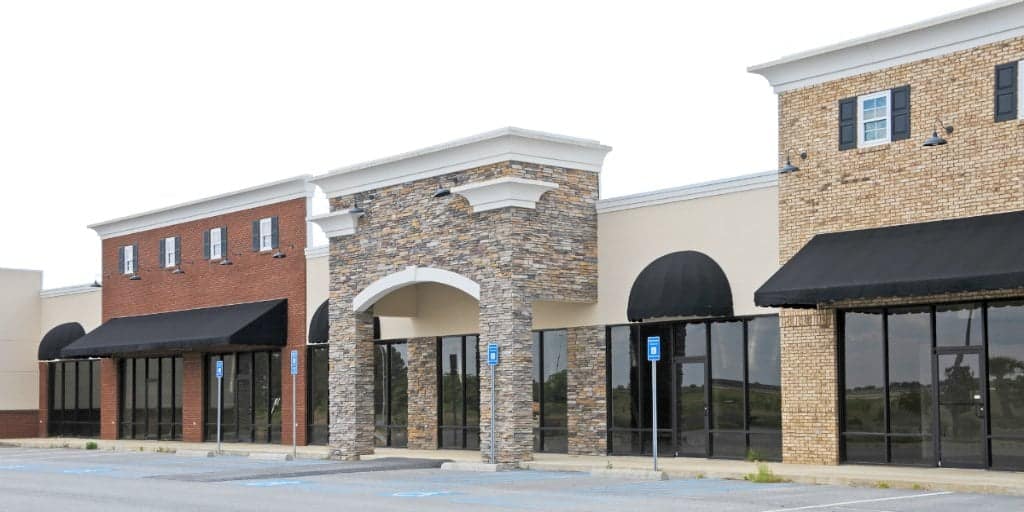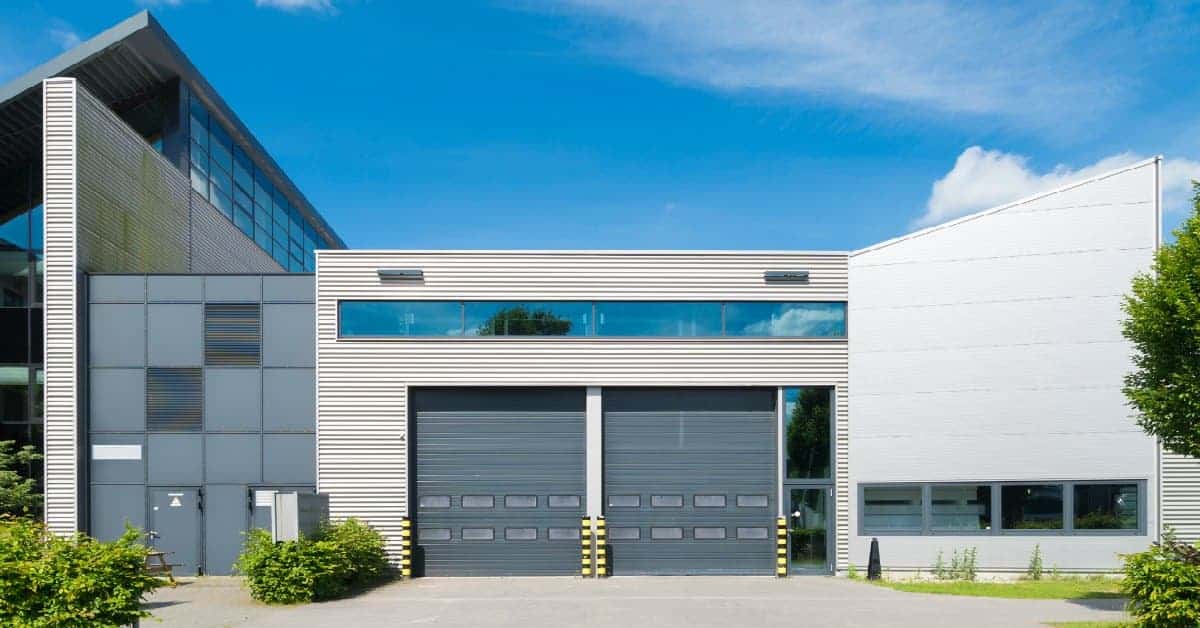Commercial Real Estate Investing: Build a CRE portfolio
(This page may contain affiliate links and we may earn fees from qualifying purchases at no additional cost to you. See our Disclosure for more info.)
Whether you already own residential rental properties or you’re still deciding if real estate investing is how you want to build wealth, the idea of purchasing commercial real estate may have crossed your mind.
Commercial real estate (also known as CRE) includes any non-residential property used solely for business purposes.
Investing in commercial real estate is very different from residential real estate investing, so before you can start calculating the potential profits of a CRE deal, there are many things to do and know about this alternative type of investing.
It's wise to spend time educating yourself early to make the smartest decision possible as you continue building and securing your financial house.
Here we'll dive into the following to help you begin learning how to start investing in commercial real estate:
- Types and Classifications of Commercial Properties
- Benefits of Owning CRE
- Drawbacks to CRE Investments
- Commercial Real Estate Lingo
- Financing Basics/Options
- Tough Questions to Ask Yourself
- Assembling a Team of Experts
- Research and Inspection of Properties
- Completing your Due Diligence

Types and Classifications of Commercial Investment Properties
Each type of commercial real estate investment property can be further classified based on characteristics, including purpose, size, location, and kind of construction.
Here are some examples of different CRE properties:
1. Retail/Restaurant
As a commercial real estate investor, you can focus on strip malls, regional malls, downtown storefronts, grocery stores, drug stores, and more.
Have you thought about buying a restaurant, pub, or specialty retail store? Those are a few commercial businesses you might consider purchasing with a property.
2. Office Buildings
You can invest in a small office building, a high-rise office building, or a multi-building office park.
One of the benefits of this type of investment is that many have triple net (“NNN”) leases.
In this type of contract, the tenants pay you a fixed rent, and they are also responsible for insurance on the property, real estate taxes, and all maintenance and repairs.
3. Industrial Properties
Commercial property investors can also consider manufacturing facilities or warehouses.
Some of these properties have large customized buildings for special use, while others may have mixed uses and include office space.
4. Multifamily Housing
Whether you are looking at a 5-unit apartment building or an apartment complex with hundreds of units, these are popular properties with many CRE investors.
5. Land Investments
Farmland, vacant land, or land being re-purposed are examples of commercial real estate land investments you can consider investing in.
6. Miscellaneous
There are plenty of other CRE properties that people invest in, including self-storage facilities, gas stations, ice skating rinks, golf courses, hotels, and ice cream stands.
Classifications for Commercial Office Buildings
A classification rating system helps investors, landlords, tenants, and real estate brokers identify and compare commercial office buildings.
These classifications are subjective and may vary greatly between geographic locations and between landlords and tenants.
These A, B, and C classes are based on building age, technology, quality of mechanical systems, location, infrastructure, ongoing maintenance, and building services and amenities.
Possible amenities include restaurants, coffee shops, food courts, fitness centers, copy, mail, shipping services, or childcare centers.
- Class A – Think latest and greatest. The newest, most modern spaces on the market, with top-notch amenities and state of the art technology. Highly sought after space in central business locations. Tenants typically include banks, law firms, advertising agencies, large accounting firms, etc.
- Class B – Think more sensible but still very nice and functional. Comfortable spaces, possibly former Class A buildings, at a more favorable price just slightly outdated.
- Class C – Think out-of-date, rough but useable space. Economical commercial space with no (or very few) amenities.

Benefits of Owning Commercial Real Estate
Note: The benefits of owning commercial real estate described below are generalizations. Every potential property has specific traits that need to be considered on its own merits.
CRE investors are in the business to make money, and commercial properties can have some advantages over residential real estate.
1. The potential for greater cash flow and reduced levels of risk.
If you purchase CRE with multiple units, you have more tenants paying rent. So, if you lose one tenant, you still collect rents from the other tenants – unlike renting out a single-family home. This can help to reduce your risk when you have vacancies.
2. Tenants may take better care of your property.
If you purchase a strip mall or a building with a retail store or a restaurant, the businesses renting from you want to attract customers to make a profit. This may benefit you because they will focus on keeping up your property.
3. Longer leases can stabilize cash flow.
Other than multi-family properties, CRE leases tend to be longer, which helps with the stability of your cash flow. It may also be easier to remove non-paying tenants in CRE investments than to evict people in residential housing.
4. Less competition.
If you decide to invest in the commercial real estate market, you may face less competition from other investors. Higher upfront costs and a lack of experience and knowledge will keep many from investing in CRE.
When researched and planned well, commercial real estate investing can be a significant way to build financial wealth.
Drawbacks to Commercial Real Estate Investing
Note: The drawbacks of owning commercial real estate described below are generalizations. Every potential property has specific traits that need to be considered on its own merits.
Even though owning commercial real estate has many benefits over residential real estate investing, you need to consider the disadvantages.
1. It will likely cost more money.
If you need financing for your CRE purchase, you’ll need to find lenders offering commercial loans. You can also expect to put more down for the property – possibly 30% or more of the purchase price.
With larger properties, your capital expenses are higher; there's more equipment to purchase and more to repair. With greater use, CRE property brings higher maintenance costs too.
2. It will likely take longer.
When comparing CRE investing to residential RE investing, most things take longer to complete. Researching and inspecting properties is months long versus a few days or weeks.
Finding and approving tenants will usually take longer. Any repairs, build-outs, or renovations will typically take longer as well. However, the typical commercial lease is longer too. Staying patient is key.
3. There’s a greater chance of legal issues.
Along with higher costs from more traffic comes a greater chance of legal problems too. It will be essential to have adequate insurance and to have a lawyer who understands CRE to advise you.
4. So many rules and regulations.
This is another reason to surround yourself with a team experienced with CRE’s if you choose to invest in one.
In addition to your attorney, using a realtor with commercial property experience and an experienced accountant can make owning the property much easier.
Many who purchase commercial real estate also use professional property management services rather than managing the property themselves.
You'll want to consider this in your financial planning for the property.
Commercial real estate investing is also more vulnerable to downturns in the economy. The sale of CRE can also take a long time because the properties appeal to a smaller investor demographic.

Commercial Real Estate Lingo
You'll benefit from knowing many commercial real estate terms if you decide to invest in CRE. Here are a few to start with:
Financing CRE Investments
Commercial property loans are not generally made out to individuals but to business entities – corporations, S-corps, LLCs, developers, limited partnerships, funds, trusts, etc., instead.
For newer businesses that may not have a lengthy financial record or credit rating, the lender will likely require a loan guarantee by the entity owners or principals.
There are several types of commercial real estate loans available, but here are some options you might consider.
Traditional Commercial Mortgage
Banks typically make most CRE loans to entities with strong credit scores and histories. Similar to residential mortgages, the purchased property secures the commercial loan.
These loans offer competitive interest rates, while terms may vary widely between lenders.
Some financial institutions may make fully amortized loans with terms up to 25 years and loan-to-value ratios up to 80%, but more likely in the range of 65-75%.
Other banks may make interest-only loans with shorter terms and loan-to-value ratios. Beware of penalties for paying off these types of loans early.
SBA 7(a) Loan and SBA 504 (or CDC) Loan
The Small Business Administration (SBA) guarantees these loans made by banks to small business owners.
SBA financing is available for an owner-occupied property – you'll need to own a business you can move into it, occupying at least 51% of the property.
7(a) loans generally offer more flexibility on terms and potentially lower down payments compared to other financing options.
They're available in amounts up to $5 million to:
- purchase new land (including construction costs)
- purchase or expand an existing business
- fund startup costs
- repair existing capital
- refinance existing debt
- purchase machinery, furniture, fixtures, supplies, or materials
According to the SBA, 504 loans can be used to:
- purchase land and existing buildings
- long-term machinery and equipment
- make improvements
- build new facilities
- modernize, renovate or convert existing facilities
While a 504 loan cannot be used for:
- Working capital or inventory
- Consolidating, repaying or refinancing debt
- Speculation or investment in rental real estate
Conduit/CMBS Loans
CMBS loans or conduit loans are commercial mortgages pooled with similar loans and packaged into bonds for sale to investors on the secondary market.
These loans are known for their less stringent credit requirements and often come with fixed-rate terms of 5, 7, or 10 years.
Soft and Hard Money Loans
Hard money loans are asset-based loans secured by the value of a real estate property, often at higher interest rates and shorter terms than traditional commercial mortgages.
They are typically utilized to quickly finance deals in the interim while negotiating a longer-term traditional or SBA bank loan.
These “bridge-like loans” are made by private companies making them easier to qualify for and faster to fund than a traditional mortgage but at higher down payment requirements.
Soft money loans are a cross between hard money loans and traditional mortgages.
Soft money lenders will look for creditworthiness and a strong application but be less stringent than traditional mortgage lenders.
This means you can get a lower interest rate, down payment, and longer terms than you would with a hard money loan.
Questions to Ask Yourself as You Consider Investing
Before jumping into commercial real estate investing, there are many things to consider. After reviewing the information covered above, ask yourself these questions:
- What are you looking to use the commercial real estate for?
- a building for your own business
- property to rent out
- several units to build a portfolio
- and/or something else entirely
- What type of CRE are you looking for?
- If you're looking for CRE for your own business, do you need to purchase a building or could you lease a property?
- How important is the location of the property?
- How will you finance the property?
- Do you have ample cash for down payments and business filings?
- Is your credit history strong?
- Are you willing to consider a partner for the purchase of a property?
- What knowledge and skills do you currently have and what will you need to learn to be successful?
- Do you have time to commit to the property? How much?
- How much work and money are you willing to put into a property?
- Are you willing and able to handle the responsibilities of being a landlord?
- Or will you use a property manager?
- What experts do you currently know who might be good members for your team?
- Finally, are you mentally and financially ready to make a sizeable investment of your time and money in a CRE?

Assembling an Expert Commercial Real Estate Investing Team
Commercial real estate investing can be a complicated process. So hiring experts to assist with some of the steps may be prudent for success.
Who you need may depend on the type and size of the CRE you are considering.
Minimally you'll likely want to have a commercial realtor and broker and an accountant and lawyer specializing in commercial real estate on your team.
Additional experts to consider include:
- appraisers
- tax experts
- building engineers
- architects
- environmental specialists
Once the property is purchased, you may also need assistance with construction, marketing, leasing, maintenance, and more.
While you can likely learn and do things on your own, it may be wise to hire an expert instead; saving you money in the long run.
Research and Inspection of Properties
When you're ready to view properties, assemble a list of items to consider for each property you see. Some ideas are listed below:
- What is the property type and classification?
- How is it currently being used?
- What other ways can it be used? How can't it be used?
- How much rent/income is the property currently generating each year?
- What are the current annual operating costs and what taxes are on the property?
- What is the vacancy rate?
- Are there any items in need of repair or replacement soon?
- Why is the owner selling?
- How long has the property been on the market?
- Is the area around the property progressing or regressing?
- Any significant upcoming changes for the neighborhood?
Due Diligence
As you view properties and narrow down your options, you'll want to perform thorough due diligence on any CRE you're interested in submitting offers for.
This will help you verify the property is a sensible investment option. You'll want to ensure you know as much as possible about the property, immediate area, and neighborhood around it, current owner, and deal.
This is not a time to skimp on hiring experts as needed. Having as much solid and reliable information as possible before signing a contract will be worth the expense.
In addition to researching and inspecting properties, you'll want to :
- Analyzing comparables – Generally, when finding comps, choose properties with square footage no more than 10 percent higher or lower than the property you have an interest in buying.
- Do the math – Being a successful investor in commercial real estate, requires understanding several formulas such as:
- Net Operating Income: A calculation of all revenue and costs from a property, before taxes. Expenses may consist of property taxes, insurance, utilities, maintenance, repairs, property management, and janitorial fees.
- Cap Rate: A calculation of the value of an income-producing property. Basically, it's the ratio of net operating income to property value.
- Cash On Cash: A calculation – net operating income divided by initial cash investment – providing a rate of return on real estate transactions.
- Know the zoning, occupancy, and environmental ordinances and requirements
- Understand the financing requirements
Proper due diligence will help prevent making significant mistakes in commercial real estate investing.
Final Thoughts
Many people buy a single-family house or a duplex to rent when they begin investing in real estate, while others might try flipping a house.
However, investing in commercial real estate may offer a higher earning potential – if you can find the right deal.
But with many businesses closing, reducing staff, and changing how (or where) employees work in the last couple of years, the opportunity to make a substantial amount of money in CRE may be reduced.
As long as you're in a financial position to purchase a commercial property, understand the risks, and have management in place if you need it – CRE investing may be a great way to diversify your investments.

Written by Women Who Money Cofounders Vicki Cook and Amy Blacklock.
Amy and Vicki are the coauthors of Estate Planning 101, From Avoiding Probate and Assessing Assets to Establishing Directives and Understanding Taxes, Your Essential Primer to Estate Planning, from Adams Media.
In addition to the sources and articles linked above, information was also gathered from articles found at FortuneBuilders.com.
